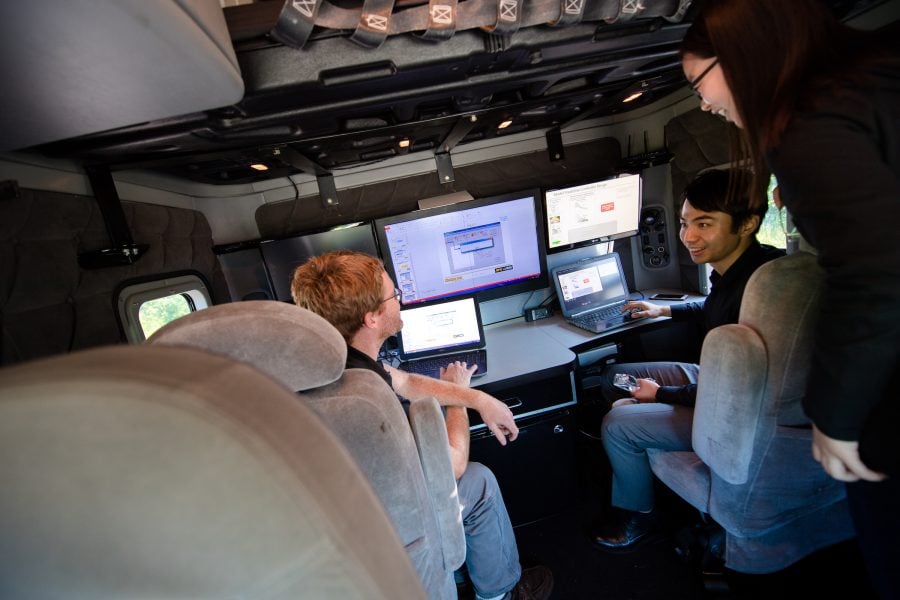
After accomplishing the mission of NEXTCAR I, Mechanical Engineering Professor Jeff Naber and his team are looking to continue shaping the future of connected and autonomous vehicles through participation in NEXTCAR II.
With funding from the Department of Energy’s Advanced Research Projects-Energy (ARPA-E), the team will shift their focus from a 20 percent reduction in energy consumption in light-duty hybrid electric vehicles to a broader application of vehicles with level 4 and 5 of autonomy.

Director of Michigan Tech’s Advanced Power Systems Research Center.
Before being awarded inclusion to NEXTCAR II, the team developed and demonstrated their energy reduction technologies on a fleet of eight Gen II Chevy Volts on a 24-mile test loop, showcasing their energy optimization, forecasting, and controls including vehicle-to-vehicle communications, location mapping, and thorough data management.
“We met our goals for energy reduction on the Chevy Volt, which set us up for NEXTCAR II now in partnership with GM on the Bolt electric vehicle (EV) and with Stellantis for an evaluation on the RAM 1500 and the Chrysler plug-in hybrid electric vehicle (PHEV) Pacifica,” says Naber.
Naber and the team will seek to reduce energy consumption by 30 percent in the hybrid Chrysler Pacifica and further apply the savings to the RAM 1500 and the Chevy Bolt, while also considering level 4 and 5 autonomy to gain efficiencies.
“The impact of this program through our $4.5 million grant is greater because of the diversity in vehicle and propulsion systems technology that can be influenced by our developments,” explains Naber.
The first challenge the group faces is developing three autonomous vehicles integrated with in-vehicle energy controls to meet their goals. “We have Drs. Jeremy Bos and Darrell Robinette on the team to leverage the work they have done in the SAE AutoDrive Challenge and are bringing in external suppliers to achieve level 4 autonomy functions,” he adds. “With NEXTCAR I, we didn’t have autonomy functions in the picture, so now we have the added instrumentation, intelligence, and all of the vehicle integration that comes along with autonomy.”
A key component of NEXTCAR II is the conversion and deployment of the NEXTCAR I technologies in these three new vehicles, with further expansions enabled by the higher levels of vehicle automation and autonomy.
“At the end of the project, we will have all three vehicle systems operating as fully autonomous— with LIDAR, sensors, integrated controls, and actuation of steering, braking, and acceleration.”
The group will maintain vehicles in multiple locations, both on the Michigan Tech campus and for road testing at the American Center for Mobility (ACM). ACM is a partner in the project, along with Stellantis and GM. The team is lead by Naber, with Co-PIs Drs. Jeremy Bos, Darrell Robinette, Bo Chen, Grant Ovist, and Basha Dudekula along with several graduate students.
“We will be conducting the baseline testing here and controls development in the labs at the APSRC and then we’ll conduct closed track testing at ACM to implement our defined controls and autonomy specifications,” replies Naber. “There are many teams working on autonomous vehicles, but with NEXTCAR we get the opportunity to combine that with energy reduction objectives.”
The NEXTCAR team is delivering engineering solutions as they move from abstracted technology to direct implementation within the realities of on-road conditions.
“We are combining theory, simulation, and real-world implementation on three different vehicle platforms that will have a true impact on our roadways. We know the energy to run the computers and the sensors in today and tomorrow’s vehicles will be a significant penalty especially for EVs. Everyone has different solutions, but we get to zero in on it further,” Naber explains.
The NEXTCAR II project is enhanced by the University’s Tech Forward initiative in Autonomous and Intelligent Systems, led by Naber. Efforts over the last two years include developing the RAM and simultaneously a Great Lakes Research Center watercraft for the purposes of extending research and education in these areas across campus.